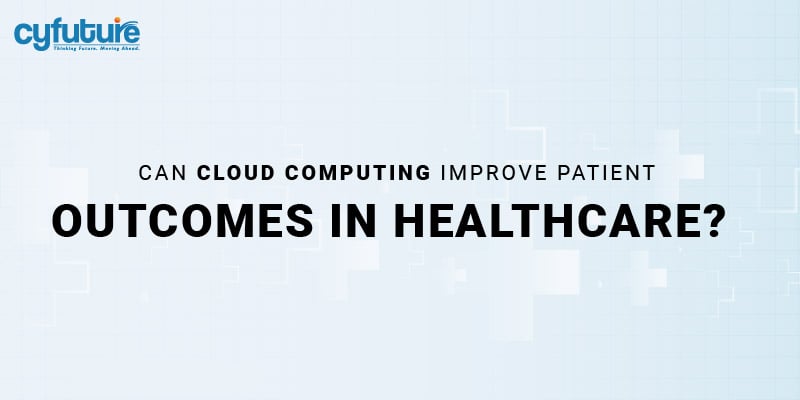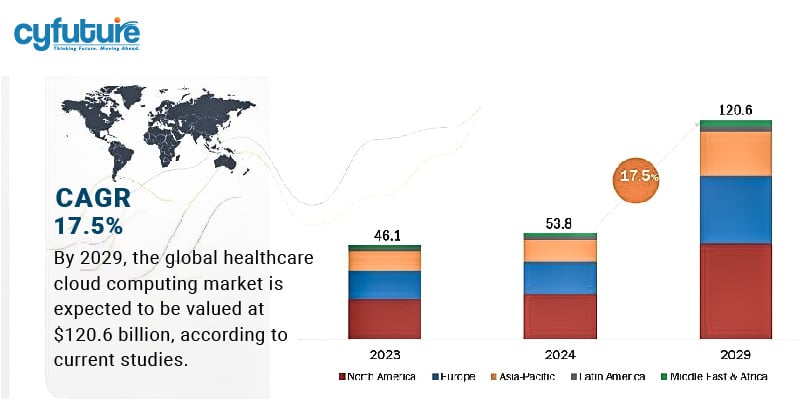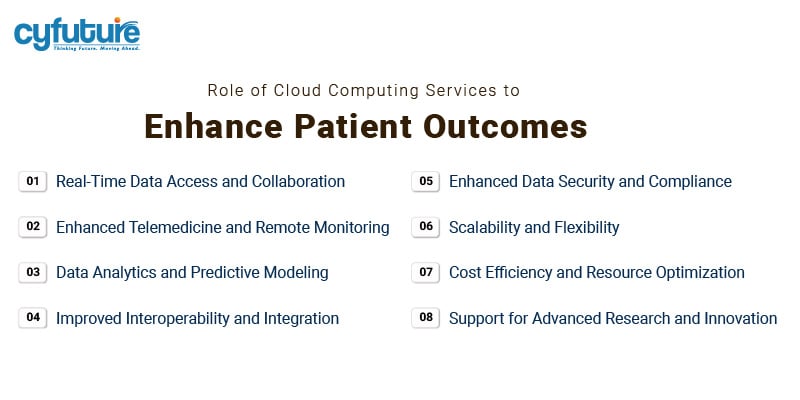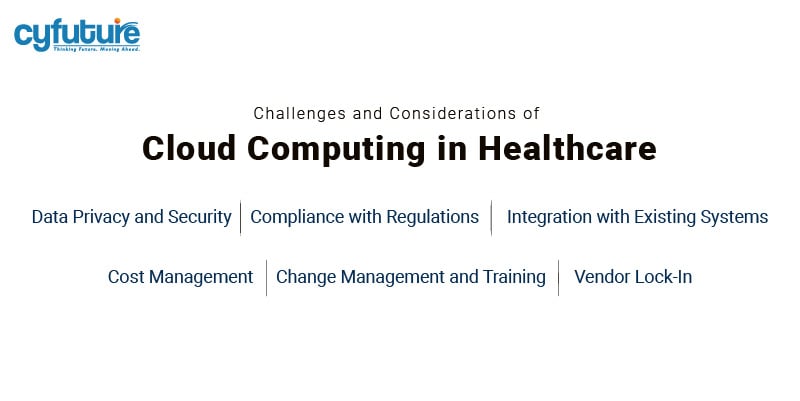-
Get Cloud GPU Server - Register Now!
Toggle navigation

The healthcare industry is experiencing an increase in issues related to cost optimization, management of patient demands, and obtaining actionable insights from medical data. Currently, improved data management systems that ensure effective communication among healthcare providers and smooth day-to-day operations are needed in the healthcare digital ecosystem. This is exactly where cloud computing plays as a savior.
Every aspect of patient care, from diagnosis to treatment and beyond, is surrounded by data pulses. Nevertheless, it can be difficult to safely store this kind of data so that it can be utilized effectively to enhance patient outcomes because it may originate from a variety of sources and formats and may be in large quantities. The solution lies in cloud computing, an innovative technology that is completely changing the healthcare landscape.

Cloud computing has become indispensable in a time when personalized treatment plans, real-time patient monitoring, and precision medicine are becoming standard practices. Cloud service providers can produce better healthcare outcomes. This is because of their massive information storage capacities and sophisticated analytics, which allow them to provide prompt, accurate, and effective services in a range of scenarios. But does this mean that patients’ health may benefit from cloud computing?
This blog explores the disruptive potential of cloud computing services, looking at how they are changing the healthcare industry and enhancing patient outcomes.
Cloud computing services are delivering computing resources over the internet such as servers, storage, databases, networking, software, and analytics, instead of depending on local servers or personal devices. Providers of these services include Amazon Web Services (AWS), Microsoft Azure, and others who provide a range of solutions designed to meet specific requirements in healthcare.
In healthcare, cloud computing is more than just data storage. It enables disparate systems to be brought together; remote care facilitated; data-driven decision-making improved and collaborative care models promoted. This leads to a healthcare system that is more connected, efficient, and patient-centered.

Cloud computing has the enormous benefit of allowing real-time data access and sharing which is its strongest point in the healthcare industry. In emergencies, a patient’s medical history can be a matter of life or death as timely access to it matters most. Healthcare providers can retrieve their patients’ records from cloud servers regardless of where they are located; hence this ensures that they have all the required information about them at any time.
In addition, it enables collaboration among healthcare providers. In traditional settings, geographical barriers, different systems, and data silos often impede cooperation. However, with cloud computing services these barriers are broken down because they offer a single platform for multiple providers to access and contribute to a patient’s care plan. Consequently, this collaborative approach guarantees patients receive holistic coordinated care thereby improving outcomes.
The COVID-19 pandemic has led to an increase in telemedicine and remote patient monitoring. These innovations are largely based on Cloud Computing as it offers the necessary infrastructure for virtual consultations, distant diagnostics, and continuous observation.
Patients can connect with health care providers from their homes through cloud-based platforms and visit a doctor less. For example, patients suffering from chronic diseases can be monitored constantly via cloud servers that monitor their vital signs remotely and send the data to healthcare providers almost live. In such a manner, it permits an early detection of potential problems and timely treatment as a result of continuous flow of data leading to good patient outcomes.
The amount of data generated by the healthcare sector is very huge ranging from electronic health records (EHRs) to imaging studies, genomic data, and others. Understanding this information will help clinical decisions as well as improve patient outcomes. In this aspect, cloud computing services are essential since they provide the required computational power together with advanced analytics tools for processing and analyzing large datasets.
By using cloud-based analytics, healthcare professionals can recognize patterns, and anticipate consequences while coming up with personalized treatment schedules as well. Predictive modelling may for example be used to detect people who have chances of developing specific conditions hence permitting early intervention measures that help avoid further advancement of diseases. Moreover, cloud computing facilitates the integration of artificial intelligence (AI) and machine learning (ML) algorithms, which can analyze data in real-time to provide actionable insights, further enhancing patient care.
Interoperability is the ability of diverse healthcare systems to communicate effectively and share data across platforms (Read, 2019). Disparities between systems make it difficult for providers to share necessary information leading to fragmented care practices. In this regard, cloud computing services offer enormous help by providing an integrated, standardized, and easily accessible repository for data from different sources.
Through cloud-based interoperability solutions, healthcare providers can ensure that all relevant information is available when and where it is needed. A comprehensive view of a patient’s health enables more informed decision-making, reduces the risk of errors arising from wrong prescriptions, and hence guarantees continuity of care that translates into better patient outcomes.
Data security remains a burning issue in healthcare because it involves highly confidential patient information. There are strict rules in the healthcare sector such as the Health Insurance Portability and Accountability Act (HIPAA) that require protection of patient information. However, cloud service providers have gone a long way in ensuring that their platforms are secure by providing numerous features for protecting healthcare data.
Security features consist of encryption, access controls, routine security audits, and adherence to industry standards. The advantages that cloud computing brings to healthcare organizations include cutting-edge security solutions that help to minimize the chances of data breaches while ensuring they comply with regulations. By doing so, trust and confidence among patients are fostered thus improving their health outcomes.
The healthcare sector is marked by dynamism in terms of resources depending on seasonal diseases, epidemics, or technological advancement. Cloud computing is characterized by flexibility and scalability which helps to react to these changes. Cloud service providers present scalable solutions that enable healthcare institutions to modify their computing abilities according to the increasing demand thus making it easier for them to manage floods of data or the number of people using services.
In times of calamities like the COVID-19 pandemic when there was a sudden rise in telemedicine and remote monitoring service requirements; this scalability is significant. Healthcare providers could instantly expand their services on cloud servers enabling them not only to meet an upsurge but also to maintain quality and good outcomes for patients at all times.
In health care, the usage of cloud computing is not only because of the need for better outcomes for patients but also due to the necessity to optimize resources and cut costs. This is so because traditional IT infrastructures that are on-site require a lot concerning capital expenditures on hardware, maintenance, and personnel. On the contrary, cloud computing services operate on a pay-per-use basis enabling healthcare organizations to pay only for what they use.
This approach saves money thereby allowing more resources to be committed to patient care, research, and innovation. Furthermore, with less requirement for onsite IT infrastructure healthcare facilities can concentrate more on their primary goal which is providing high-quality patient care by leaving the management of IT resources to cloud computing service providers.
Cloud computing is not an exception where it has made patients’ care better and helped in advancing medical research as well as innovations. The possibility of storing large sets of data on the cloud and analyzing them has made new paths possible, especially in fields like genomics, drug discovery, or precision medicine.
It is for example that cloud computing services have enabled researchers to process and analyze genomic data at an extraordinary scale facilitating the discovery of new biomarkers as well as targeted therapy development. In addition, cloud-based platforms allow for worldwide collaboration among scientists hastening innovation speedily and making it possible for clinical practice to occur quickly based on research findings.
As a result of this fastened research and innovation cycle, patients ultimately gain through the quicker introduction of new treatments and therapies into the market which leads to better outcomes, especially among patients with complicated or rare conditions.

Even though cloud computing offers tremendous advantages in healthcare, it is worth noticing that there are challenges in its adoption. Before completely adopting cloud computing, healthcare organizations need to think through various things:
Patient data protection should be given prime consideration; therefore, healthcare organizations must ensure that the cloud service provider they select follows industry regulations and has a strong security system. For example; encryption, access controls, and regular security checks.
The healthcare sector operates under strict regulations so organizations should make sure that when using cloud computing services they do not violate any relevant regulation like HIPAA within the United States or GDPR across Europe. In addition, these cloud service providers must be able to provide solutions that meet those requirements on regulation.
Many healthcare establishments have legacy systems that may not easily integrate with solutions based on the Cloud architecture. For maximizing the benefits derived from using the Cloud technology seamless integration and interoperability between current systems and these servers is vital.
Healthcare organizations need to be aware of the potential for unforeseen expenses when using cloud services since it’s possible to incur costs that exceed what was planned (Faiola &. Kniess, 2014). So they have to keep an eye on their cloud service usage, optimizing resource allocation accordingly and negotiating favorable terms with their providers

In most cases, the introduction of cloud computing necessitates drastic alterations in standing procedures and working arrangements. In this regard, healthcare institutions should consequently put money into personnel instruction and management processes regarding changes so that employees can competently utilize the new tools or technology based on the cloud.
In addition, healthcare organizations must guard against vendor lock-in syndrome where they become excessively reliant upon a single provider for Cloud Services. Such suppliers must allow flexibility by choosing those who offer just such options or making it simple enough to migrate between platforms if necessary.
The adoption of cloud computing in healthcare is still in its early stages, but the potential for transformative impact is immense. As technology continues to evolve, we can expect to see even greater integration of cloud computing services in healthcare, with advancements in AI, machine learning, and IoT further enhancing patient care.
In the future, cloud computing will likely play a central role in enabling precision medicine, where treatments are tailored to the individual characteristics of each patient. It will also support the development of new models of care, such as value-based care, where providers are incentivized to deliver high-quality, cost-effective care.
Moreover, as the healthcare industry continues to generate vast amounts of data, the role of cloud computing in managing, analyzing, and leveraging this data will become even more critical. Cloud service providers will continue to innovate, offering new solutions that address the unique challenges of the healthcare industry and drive improvements in patient outcomes.
In addition to being a technological innovation, cloud computing catalyzes a new epoch of patient-centered care. Healthcare providers can offer better, timely, and effective healthcare through real-time data accessibility, enhanced cooperation among different health professionals, and telemedicine support. This has led to better patient outcomes, improved efficiency, and more integrated healthcare systems.
However, when healthcare organizations adopt cloud computing they have to face challenges and considerations that go along with this technology. This enables them to get rid of all the obstacles that deter people from moving forward by choosing their cloud service providers carefully; meeting regulations compliance; and investing in change management so that they can gain full advantages from this type of computing and usher in a transforming age in patient care.
Ultimately, the question is not whether cloud computing improves patient outcomes but how best to harness this powerful technology for quality care delivery that is centered on individual clients. The future lies within the clouds with an infinite amount of possibilities for enhancing patient outcomes ahead of us.
FAQs –
Cloud computing does support remote patient monitoring through the secure transmission of data from wearable devices and home monitoring tools which allows healthcare professionals to monitor real-time patient health metrics thereby making timely interventions.
Cloud-based collaboration tools allow sharing of patient information by healthcare teams, discuss individual cases as well as coordinate for effective management. It improves communication and reduces errors while enabling all team members to use up-to-date patient data.
Cost reduction has been realized through reducing costs associated with expensive on-site infrastructure and lower maintenance costs; furthermore providing scalable solutions that suit different needs within health service providers. Such efficiency may lead to cost-saving measures plus better allocation of resources.